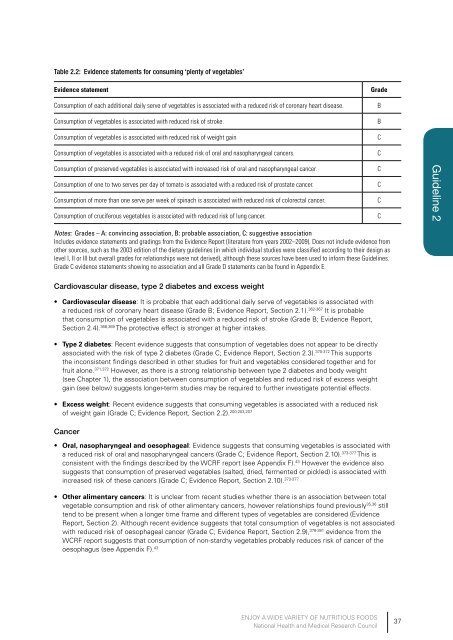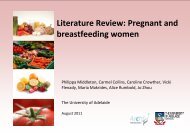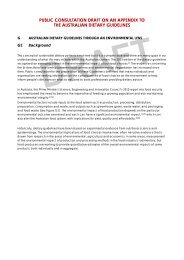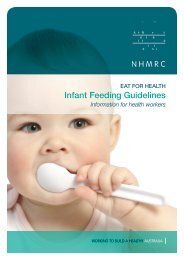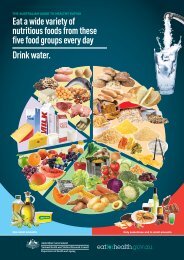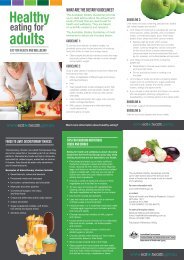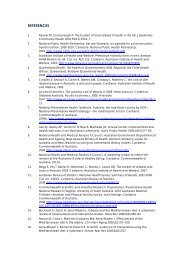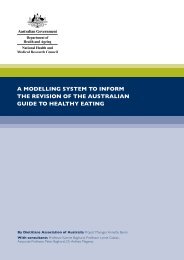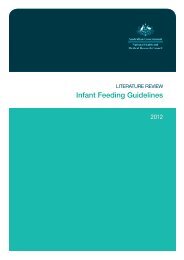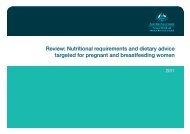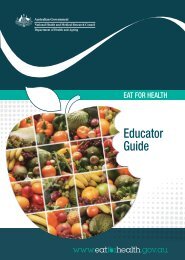Guidelines Dietary - Eat For Health
Guidelines Dietary - Eat For Health
Guidelines Dietary - Eat For Health
- No tags were found...
Create successful ePaper yourself
Turn your PDF publications into a flip-book with our unique Google optimized e-Paper software.
Table 2.2: Evidence statements for consuming ‘plenty of vegetables’Evidence statementConsumption of each additional daily serve of vegetables is associated with a reduced risk of coronary heart disease.Consumption of vegetables is associated with reduced risk of stroke.Consumption of vegetables is associated with reduced risk of weight gainConsumption of vegetables is associated with a reduced risk of oral and nasopharyngeal cancers.GradeBBCCConsumption of preserved vegetables is associated with increased risk of oral and nasopharyngeal cancer.Consumption of one to two serves per day of tomato is associated with a reduced risk of prostate cancer.Consumption of more than one serve per week of spinach is associated with reduced risk of colorectal cancer.Consumption of cruciferous vegetables is associated with reduced risk of lung cancer.CCCCGuideline 2Notes: Grades – A: convincing association, B: probable association, C: suggestive associationIncludes evidence statements and gradings from the Evidence Report (literature from years 2002–2009). Does not include evidence fromother sources, such as the 2003 edition of the dietary guidelines (in which individual studies were classified according to their design aslevel I, II or III but overall grades for relationships were not derived), although these sources have been used to inform these <strong>Guidelines</strong>.Grade C evidence statements showing no association and all Grade D statements can be found in Appendix E.Cardiovascular disease, type 2 diabetes and excess weight• Cardiovascular disease: It is probable that each additional daily serve of vegetables is associated witha reduced risk of coronary heart disease (Grade B; Evidence Report, Section 2.1). 362-367 It is probablethat consumption of vegetables is associated with a reduced risk of stroke (Grade B; Evidence Report,Section 2.4). 368,369 The protective effect is stronger at higher intakes.• Type 2 diabetes: Recent evidence suggests that consumption of vegetables does not appear to be directlyassociated with the risk of type 2 diabetes (Grade C; Evidence Report, Section 2.3). 370-372 This supportsthe inconsistent findings described in other studies for fruit and vegetables considered together and forfruit alone. 371,372 However, as there is a strong relationship between type 2 diabetes and body weight(see Chapter 1), the association between consumption of vegetables and reduced risk of excess weightgain (see below) suggests longer-term studies may be required to further investigate potential effects.• Excess weight: Recent evidence suggests that consuming vegetables is associated with a reduced riskof weight gain (Grade C; Evidence Report, Section 2.2). 200-203,207Cancer• Oral, nasopharyngeal and oesophageal: Evidence suggests that consuming vegetables is associated witha reduced risk of oral and nasopharyngeal cancers (Grade C; Evidence Report, Section 2.10). 373-377 This isconsistent with the findings described by the WCRF report (see Appendix F). 43 However the evidence alsosuggests that consumption of preserved vegetables (salted, dried, fermented or pickled) is associated withincreased risk of these cancers (Grade C; Evidence Report, Section 2.10). 373-377• Other alimentary cancers: It is unclear from recent studies whether there is an association between totalvegetable consumption and risk of other alimentary cancers, however relationships found previously 35,36 stilltend to be present when a longer time frame and different types of vegetables are considered (EvidenceReport, Section 2). Although recent evidence suggests that total consumption of vegetables is not associatedwith reduced risk of oesophageal cancer (Grade C; Evidence Report, Section 2.9), 378-381 evidence from theWCRF report suggests that consumption of non-starchy vegetables probably reduces risk of cancer of theoesophagus (see Appendix F). 43Enjoy a wide variety of nutritious foodsNational <strong>Health</strong> and Medical Research Council37


